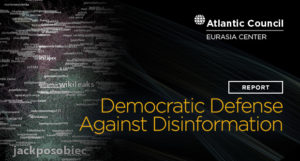The problem of disinformation is “broader than Russia” because other foreign powers are already planning to deploy digital disinformation tools, according to a new report.
“The Russians and other purveyors of disinformation will constantly improve their tactics; our counter-tactics therefore cannot be static,” write Ambassador Daniel Fried and Dr. Alina Polyakova in Democratic Defense Against Disinformation, a new publication by the Atlantic Council’s Eurasia Center.
Since Russia’s interference in the 2016 US presidential election, governments, multinational institutions, civil-society groups, and the private sector have launched various initiatives to expose, monitor, and get ahead of disinformation attacks. Through these efforts, the transatlantic community has gleaned three valuable lessons, the report notes:
- the problem is broader than Russia or any single actor;
- a democratic response to malign influence must engage the whole of society; and
- we must work together to learn from each other’s mistakes and successes as we craft governmental and nongovernmental strategies and solutions.

RFE/RL
 “The US government should actively monitor overt foreign propaganda narratives and inform the public on their content,” advise Polyakova (left) and Fried (right), a board member of the National Endowment for Democracy. The report calls for innovative policy solutions in the United States and Europe, including the creation of a transatlantic Counter Disinformation Coalition, comprising public and private sector representatives charged with developing “best practices” for contesting disinformation, such as standards for social media companies.
“The US government should actively monitor overt foreign propaganda narratives and inform the public on their content,” advise Polyakova (left) and Fried (right), a board member of the National Endowment for Democracy. The report calls for innovative policy solutions in the United States and Europe, including the creation of a transatlantic Counter Disinformation Coalition, comprising public and private sector representatives charged with developing “best practices” for contesting disinformation, such as standards for social media companies.
“As digital and cyber technologies such as artificial intelligence, machine learning, and automation evolve and the speed and efficiency of influence operations increase, democratic societies need to invest in resilience and resistance to win the new information war,” the report adds.
“The Europeans are ready to work with us. They face the same challenges,” said Fried, a State Department official who served in both the Clinton and Bush administrations. “This is going to be an ongoing and evolving challenge.”

US Senator Robert Menendez has called for “a comprehensive strategy to shore up American democracy against Russian malign influence and implementing it without delay,” emerging, The Washington Post’s Jennifer Rubin writes, as one of those Democrats who have discovered their inner Scoop Jackson.
Russia is waging information war on a significantly broader front, Estonia’s Foreign Minister Sven Mikser told Rep. Ed Royce (R-Calif.), chairman of the House Foreign Affairs Committee.
is waging information war on a significantly broader front, Estonia’s Foreign Minister Sven Mikser told Rep. Ed Royce (R-Calif.), chairman of the House Foreign Affairs Committee.
“Hybrid threats and hostile propaganda are nothing we haven’t seen before in the Baltic states, but Russia’s now waging its information war on a significantly broader front,” he noted. “It’s important that society as a whole is aware of these threats and knows how to identify misleading information.”
Putin is distracting Western leaders from the real threat Russia poses through ostentatious displays of nuclear and conventional military power, say analysts Frederick W. Kagan, director of the Critical Threats Project at the American Enterprise Institute, and Catherine Harris, a research analyst at the Institute for the Study of War. He perfects, at the same time, the hybrid war approach he has used successfully in Ukraine and Syria, relying on proxies, mercenaries, covert operatives, information operations, cyber activities and limited conventional forces, they write for The Hill.







